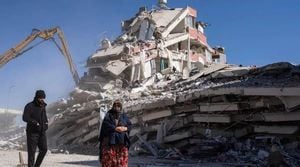On February 24, 2025, the world marked the third anniversary of Russia's unprovoked full-scale invasion of Ukraine, which commenced on the same date three years ago.
Global reactions were swift, with major international leaders and organizations issuing statements supporting Ukraine's sovereignty and denouncing Russia's aggression. The United Nations General Assembly put forward resolutions recognizing Russia as the aggressor and calling for peace and support for Ukraine's territorial integrity.
Ukrainian forces have shown remarkable resilience, successfully reclaiming more than 50% of the territory previously occupied by Russian forces. A report from the Institute for the Study of War (ISW) confirmed these gains, stating, "Ukraine continues to improve and innovate its warfighting capabilities," highlighting the technological advancements integrated with ground operations by the Ukrainian military.
Russia, attempting to reaffirm its military objectives, has endured significant losses, with estimates showing over 10,100 tanks and 21,100 armored combat vehicles lost since the invasion began. The situation for Russian forces appears increasingly dire, facing mounting personnel and equipment losses, rendering their continued offensive operations unsustainable.
Within Russia, public sentiment is showing signs of fracture. A recent poll from the independent Russian organization Chronicles revealed, "46 percent of respondents do not support the withdrawal of Russian troops from Ukraine without Russia having achieved its war goals." Yet, among those polled, 54% also admitted feeling the economic burden as the conflict drags on.
On the anniversary of the invasion, various leaders made renewed pledges of support for Ukraine, reflecting international solidarity. Canadian Prime Minister Justin Trudeau announced military aid to Ukraine, including infantry fighting vehicles and drone support, just as European leaders gathered to discuss additional assistance.
European Commission President Ursula von der Leyen declared the EU would distribute €3.5 billion ($3.6 billion) to Ukraine, alongside military support pledges from Spain, Sweden, and Ireland to bolster Kyiv as it enters another year of conflict.
Russian Foreign Minister Sergei Lavrov stated, “We will only end combat operations when negotiations bring about results favorable to Russia,” asserting the Kremlin's unwillingness to negotiate under terms it does not find favorable. This stance mirrors previous proclamations where Russian officials have dubbed the West and Ukraine's resistance as fundamentally misguided.
Domestic hardships are evidently rising among Russian families, with inflation climbing steadily as the economy buckles under the weight of the prolonged conflict. Many Russians, receiving media narratives from state outlets, remain steadfast supporters of the war, believing it imperative for their country to achieve its objectives.
Significantly, on the same day, the Russian Central Spiritual Directorate of Muslims expressed its complicity by promoting military recruitment among ethnic groups, exacerbatively framing the war effort as necessary for national security.
Meanwhile, many civil society initiatives began launching memorials to honor those affected by the war, with gatherings happening nationwide to reflect on the installed lives and continued suffering as the war perseveres.
The current state of affairs suggests no immediate resolution is forthcoming. Continuing reports from ISW emphasized how if the situation persists without significant changes, it could lead the Russian population to bear immense financial and emotional tolls, adding substance to doubts about the sustainability of public support for the warfare.
Supporters of the Ukrainian cause fervently advocate for sustained international military and humanitarian aid. Ukrainian officials remain hopeful for success, banked upon international alliances continual volunteerism of western nations and the broader global community.
With three full years of warfare behind, the tragedy of the conflict continues to manifest across both battlefields and homes globally, but Ukraine's unwavering spirit serves as both a beacon of hope and call-to-action for the worldwide audience.



